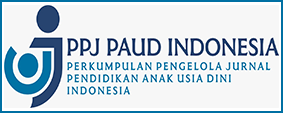
Author
Rakimahwati Rakimahwati(1
Pendidikan Anak Usia Dini, Universitas Negeri Padang, Indonesia(1)
Pendidikan Anak Usia Dini, Universitas Negeri Padang, Indonesia(2)
Pendidikan Anak Usia Dini, Universitas Negeri Padang, Indonesia(3)
Pendidikan Anak Usia Dini, Universitas Negeri Padang, Indonesia(4)
Pendidikan Anak Usia Dini, Universitas Negeri Padang, Indonesia(5)
Pendidikan Anak Usia Dini, Universitas Negeri Padang, Indonesia(6)
Pendidikan Anak Usia Dini, Universitas Negeri Padang, Indonesia(7)
Pendidikan Anak Usia Dini, Universitas Negeri Padang, Indonesia(8)
| Article Analytic |
Published : 2023-05-11
Article can trace at:
 Article Metrics
Article Metrics
Abstract Views: 223 times
PDF Downloaded: 100 times
Abstract
The development of children's creativity has not developed optimally, this can be seen from children's activities in generating new ideas and problem solving that have not been seen. The purpose of this study was to determine the effect of inquiry-based collage activities using colored shells on the development of early childhood creativity. This type of research uses quantitative methods with a quasi-experimental design. The population in this study were all students in Adzkia Air Bangis Kindergarten with a sample of 60 students which included 30 students in B1 and 30 students in B2. Data collection techniques in this study is by observation. The data analysis technique used normality test, homogeneity test and hypothesis testing, namely the independent sample test. Based on the results of this study, it was found that in the normality test the data were normally distributed with a significant value of Kolmogrov-Smirnov in each class, namely > 0.05. In the homogeneity test, it was found that the value based on the mean was 0.789 > 0.05, which means the data is homogeneous. Meanwhile, in hypothesis testing, the value of sig (2 tailed) is 0.001< 0.05. Thus, it can be concluded that inquiry-based collage activities using colored shells have an effect on the development of creativity in early childhood
Keywords
References
Abubakar, & Ngalimun. (2019). Psikologi Perkembangan (Konsep Dasar Pengembangan Kreativitas). Yogyakarta: K-Media.
Dere, Z. (2019). Investigating the Creativity of Children in Early Childhood Education Institutions. Universal Journal of Educational Research, 7(3), 652–658. https://doi.org/10.13189/ujer.2019.070302
Fakhriyani, D. V. (2016). Pengembangan Kreativitas Anak Usia Dini. Wacana Didaktika, 4(2), 193–200. https://doi.org/10.31102/wacanadidaktika.4.2.193-200
Insani, S., & Ray, D. (2019). Pengaruh Kegiatan Kolase Ampas Kelapa Berwarna Terhadap Kreativitas Anak Usia 5-6 Tahun Di TK Negeri Pembina I Binjai. Jurnal Bunga Rampai Usia Emas, 5(2). https://doi.org/10.24114/jbrue.v5i2.23023
Khales, B., & Meier, D. (2013). Toward a New Way of Learning Promoting Inquiry and Reflection in Palestinian Early Childhood Teacher Education. New Educator, 9(4), 287–303. https://doi.org/10.1080/1547688X.2013.841504
Krummheuer, G., Leuzinger-Bohleber, M., & Müller-Kirchof, M. (2013). Explaining the Mathematical Creativity of a Young Boy: An Interdisciplinary Venture Between Mathematics Education and Psychoanalysis. Educational Studies in Mathematics, 84(2), 183–199. https://doi.org/10.1007/s10649-013-9505-3
Masyitoh, R., & Efendi, D. I. (2020). Penerapan Kegiatan Kolase Dengan Media Bahan Alam Untuk Meningkatkan Keterampilan Motorik Halus Pada Anak Keompok B Ra Islamiyah. GoldenChildhood Education Journal, 1(1). http://journal.unirow.ac.id/index.php/GCEJ/article/view/170
Mayar, F., Husin, S. H., & Sari, K. (2019). Peningkatan Kemampuan Kreatifitas Anak melalui Kegiatan Menggambar Bebas Setiap Hari di Taman Kanak-kanak Darussalam. Jurnal Pendidikan Tambusai, 3(3), 1365–1373. https://jptam.org/index.php/jptam/article/view/368
McLean, K., Jones, M., & Schaper, C. (2015). Children’s Literature as an Invitation to Science Inquiry in Early Childhood Education. Australasian Journal of Early Childhood, 40(4). https://doi.org/10.1177/183693911504000407
Nurwati, N., Riyadi, A., & Cahyani, I. T. (2021). Implementasi Kegiatan Kolase dalam Menstimulasi Perkembangan Anak. BOCAH: Borneo Early Childhood Education and Humanity Journal, 1(1), 15–21. https://journal.uinsi.ac.id/index.php/bocah/article/view/3704
Permatasari, I., Sapri, J., & Kurniah, N. (2017). Penerapan Metode Pemberian Tugas Melalui Kolase Berbasis Alam untuk Meningkatkan Kreativitas dan Kemampuan Motorik Halus. DIADIK : Jurnal Ilmiah Teknologi Pendidikan, 7(2). https://ejournal.unib.ac.id/index.php/diadik/article/view/3690
Pratiwi, K. E., Haniarti, & Usman. (2020). Pengaruh Pola Asuh terhadap Kemandirian Anak di SD Negeri 38 Kota Pare-Pare. Jurnal Ilmiah Manusia Dan Kesehatan, 3(1), 31–42. https://doi.org/10.31850/makes.v3i1.288
Prayitno, & Amti, E. (2009). Dasar-dasar bimbingan dan konseling. Rineka Cipta.
Samarapungavan, A., Tippins, D., & Bryan, L. (2015). A Modeling-Based Inquiry Framework for Early Childhood Science Learning. In Research in Early Childhood Science Education, 259–277. http://dx.doi.org/10.1007/978-94-017-9505-0_12
Sugiyono. (2020). Metode Penelitian Kuantitatif, Kualitatif dan R&D. Bandung: Alfabeta.
Tok, E. (2021). Early Childhood Teachers’ Roles in Fostering Creativity through Free Play. International Journal of Early Years Education, 30(16), 1–13. https://doi.org/10.1080/09669760.2021.1933919
Undang-Undang No. 20 tahun 2003 Tentang Sistem Pendidikan Nasional.
Windayani, N. L. I., Dewi, N. W. R., Sera Yuliantini, N. P. W., Ariyana, I. K. S., Yosep Belen Keban, Komang Trisna Mahartini, N. D., Suparman, & Ayu, P. E. S. (2021). Teori dan Aplikasi Pendidikan Anak Usia Dini. Aceh: Yayasan Penerbit Muhammad Zaini.
Refbacks
- There are currently no refbacks.

_2022_inPress.png)








